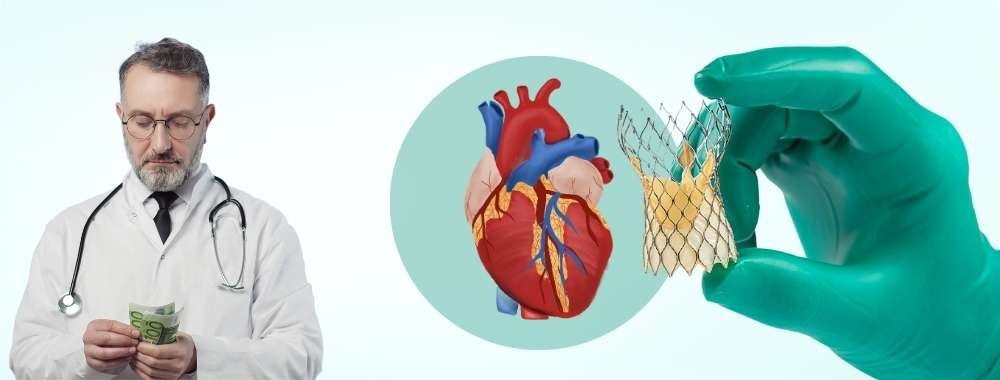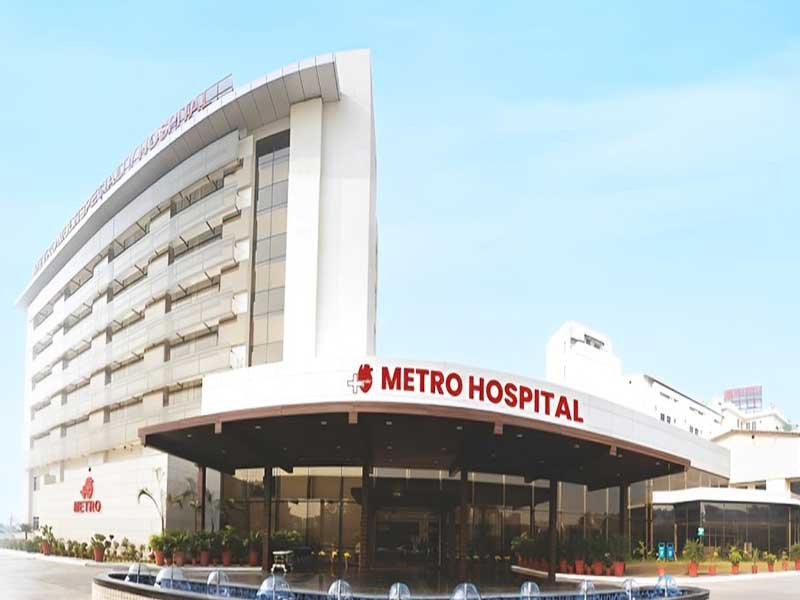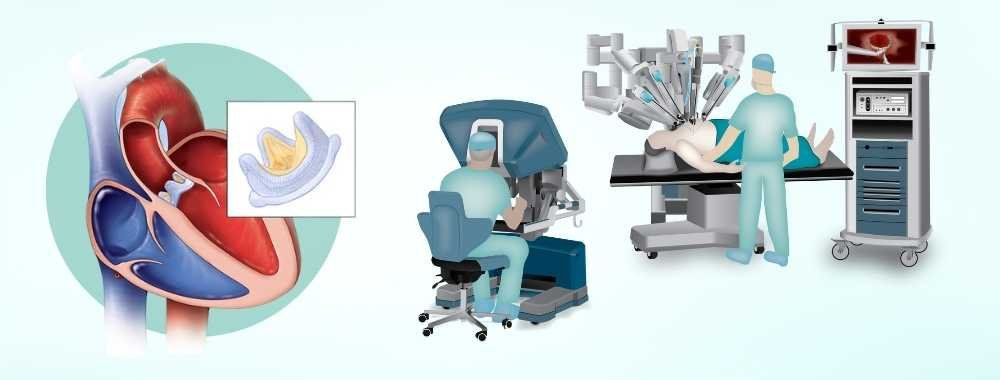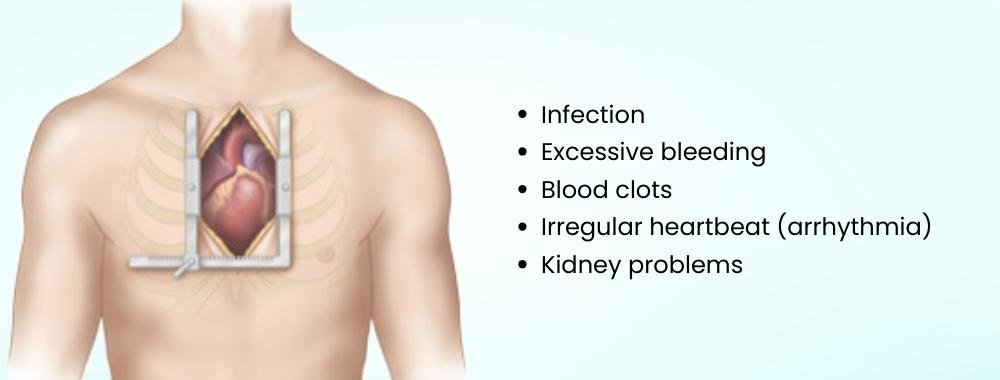For aortic valve replacement, choose India trusted surgeons, advanced care, and affordable treatment options.
Recovery Time
2-3 Weeks
Success Rate
97%
Hospital Stay
7 Days
Treatment Type
Surgical
Home Treatments Cardiac Surgery Aortic Valve Replacement
Wondering about the aortic valve replacement cost in India?
India offers a cost-effective solution, with prices significantly lower than in Western countries.
Indian hospitals are equipped with cutting-edge technology and staffed by experienced cardiac surgeons, ensuring safe and successful outcomes.
Patients receive top-notch medical care without the high costs associated with similar treatments abroad.
Choose India as your destination for aortic valve replacement and experience world-class care at an affordable price.

Aortic valve repair or replacement is performed to treat aortic valve disease.
However, mild aortic valve disease without symptoms usually does not require surgery.
Most aortic valve conditions are mechanical problems that typically require surgical intervention to reduce the risks of:
The decision to repair or replace the aortic valve depends on the severity of the aortic valve disease.
However, there are no medicines that can treat aortic valve problems, but replacing the valve will be recommended if you're at risk of serious complications.
The total cost of aortic valve replacement usually includes surgical fees, hospital charges such as hospital stays, operation rooms, and nursing care and there are extra costs as well such as diagnostic tests, medications, rehabilitation after surgery, and follow-ups.
Cost Component | Details | Estimated Cost in USD |
Pre-operative Consultation & Diagnosis | Consultations, X-rays, MRI scans, blood tests | 500 USD |
Surgery Costs | Includes surgeon fees, type of surgery, and hospital stay | 8500 USD |
Rehabilitation and Follow-up | Physiotherapy sessions, medications, supportive devices, follow-up visits |

Mechanical valves are made from durable materials such as metal or carbon. They have a longer lifespan compared to biological valves and are often recommended for younger patients who can adhere to lifelong anticoagulation therapy.
Biological valves are made from animal tissues or human donor tissues. While they are less durable than mechanical valves, they do not require lifelong anticoagulation. This option is typically recommended for older patients or those unable to take long-term medication.
In the early stages of aortic valve stenosis, you may not feel any symptoms. It can take a long time for noticeable symptoms to appear, and signs of a weakening heart are sometimes overlooked. Common symptoms include:
Common causes of heart valve disease include:
Country | Cost Structure |
India | 8500 USD |
United States | 170,000 USD |
Germany | 18000-52013 USD |
Turkey | 11500-20,500 USD |
◾Key Takeaways
✅ Affordable Treatment Cost: The cost of aortic valve replacement in India is lower than in Western countries where you can get your treatment done without compromising the quality of care.
✅ Advanced Medical Technology: Indian hospitals are equipped with some latest advancements in treating heart valves which include Transcatheter Aortic Valve Replacement (TAVR), 3-D Printing Precision, Bioengineered Heart Valves, and so on, and are accredited by international bodies.
Aortic Valve Replacement cost
Treatment Name
Estimated Cost
Aortic Valve Replacement 8500 USD Aortic Valve replacement - Mechanical Valve 8500-9000 USD Aortic Valve replacement - Tissue Valve 9500-10000 USD
India offers quality care for aortic valve replacement by combining advanced medical technologies with highly experienced cardiac surgeons. Here are some key factors that contribute to the high standard of care:
The cardiac surgeons in India are highly qualified and experienced in the field of cardiac surgery. Many of them have received international training and have been honored with prestigious awards for their expertise.
Beds: 539
New Delhi
Beds: 230
New Delhi
Beds: 710
New Delhi
Beds: 650
New Delhi
Beds: 191
New Delhi
Beds: 310
New Delhi
Beds: 299
Gurugram
Beds: 380
New Delhi
Beds: 402
New Delhi
Beds: 1300+
Gurugram
Beds: 1000
New Delhi
Beds: 450
Faridabad
Beds: 675
New Delhi
Beds: 500
New Delhi
Beds: 400+
Faridabad

Max Super Speciality Hospital, Saket

Aakash Healthcare Super Speciality Hospital

Indraprastha Apollo Hospital

BLK Max Super Speciality Hospital

Dharamshila Narayana Superspeciality Hospital

Fortis Escorts Heart Institute

Fortis Memorial Research Institute

Manipal Hospital Dwarka

Max Super Speciality Hospital Shalimar Bagh

Medanta - The Medicity Hospital

Moolchand Kharaiti Ram Hospital

Sarvodaya Hospital

Sir Ganga Ram Hospital

Venkateshwar Hospital

Metro Heart Institute with Multispecialty
Hospitals in India are highly reputed and dedicated to providing top-quality care for international patients seeking aortic valve replacement. These hospitals are equipped with advanced technology and are committed to delivering excellent healthcare services.

Advancements in cardiac surgery have revolutionized the treatment of heart valve issues, significantly improving patient outcomes and quality of life. Innovations such as 3-D printing, bioengineered heart valves, and remote monitoring through telemedicine are helping to ensure better integration, fewer complications, and continuous patient care, setting new standards in heart valve treatment.
Latest Advancements Include:
Necessary Diagnostic Tests
Before the surgery, doctors will process some tests to determine the severity of your condition, these tests include:
Tests | Description |
Echocardiogram | An echocardiogram uses sound waves to create a detailed image of the beating heart. It helps assess blood flow through the heart and valves, determining the severity of aortic valve disease. |
Electrocardiogram (ECG or EKG) | This quick test records the electrical activity of the heart, showing how the heart beats and identifying any irregularities. |
Chest X-ray | A chest X-ray provides an image of the heart and lungs. It can detect if the heart is enlarged, which may be a sign of certain types of aortic valve disease or heart failure. |
Cardiac Computerized Tomography (CT) Scan | This scan uses a series of X-rays to create a detailed image of the heart and heart valves, helping doctors assess the condition more accurately. |
🟢 Do’s Before Surgery
✅ Follow Your Doctor’s Instructions:Carefully follow your doctor’s pre-surgery instructions, including any guidelines on medications and dietary plans.
✅ Take Prescribed Medications:Continue taking any medications as prescribed by your doctor, and inform them of any new symptoms you may be experiencing.
✅ Undergo Necessary Tests:Before surgery, you may need to undergo several tests such as blood tests, ECG, and imaging scans to ensure you are healthy enough for the procedure.
✅ Maintain a Healthy Diet:Eat a balanced diet rich in fruits, vegetables, and lean proteins to strengthen your body before the procedure.
🔴 Dont's Before Surgery
❌ Don’t Smoke:Stop smoking, as it can slow the healing process and increase the risk of complications.
❌ Avoid Eating and Drinking Before Surgery:You will be asked not to eat or drink anything for at least 6-8 hours before the surgery to prevent complications with anesthesia.
❌ Avoid Certain Medications:Avoid medications such as blood thinners, aspirin, or any other drugs that could increase the risk of bleeding, as directed by your doctor.
After the aortic valve replacement procedure, you may need to stay in the hospital for about a week, starting in the ICU before being moved to a regular room.
During this time, you will be closely monitored for any potential complications, and your healthcare team will manage your diet and assist you with light activities, such as getting up and moving out of bed.
The success rate of aortic valve replacement surgery in India is about 97%, but it can vary based on factors like the patient’s age, the surgeon’s experience, the patient’s overall health, and lifestyle changes after the surgery.
However, younger and healthier patients, and those who follow a healthy lifestyle, generally have better outcomes, and having an experienced surgeon is important for achieving successful results.

Like any other surgery, aortic valve replacement is associated with some risks of complications. However, the likelihood of experiencing complications is generally higher in older patients or those with poor overall health. Possible complications include:
Aortic valve replacement is a major procedure, and in rare cases, complications can be fatal. However, the risk of death is estimated to be around 2%.
Why Choose Mejocare for Aortic Valve Replacement in India
✅ Team of Top Cardiologists: We recommend doctors with over 20 years of experience in various cardiac surgeries, including ICD implantation, pacemaker implantation, aortic valve replacement, balloon angioplasty, and more.
✅ JCI/NABH Accredited Hospitals: We partner with hospitals equipped with state-of-the-art facilities, including the latest technologies such as robotics, machine learning, and cutting-edge diagnostic and therapeutic equipment, ensuring comprehensive and personalized care.
✅ Other Benefits: We provide swift and detailed responses, accurate cost estimates, assistance with obtaining medical visas, and arranging accommodation in India. We also offer priority appointment scheduling with top doctors. Additionally, we ensure a smooth arrival in India with services like airport pickup, hotel drop-off, hospitalization assistance, and more.
Aortic valve replacement is a crucial procedure for patients with heart disease to prevent high-risk complications such as stroke, heart attack, or heart failure. If you experience symptoms, consult with doctors who can evaluate your condition and advise whether surgery is necessary.

Medically Reviewed By
Dr. Aryan Malhotra is a highly respected and compassionate medical professional with a strong academic background. He holds an MBBS and MD degree from DTMU University in Georgia. Driven by a deep sense of duty, he is dedicated to providing exceptional care to his patients.
You'll often need to spend a week or more in the hospital following an Aortic Valve Replacement.
It usually takes 4-8 weeks to recover after Aortic Valve Replacement Surgery.
Treatment for aortic valve disease that is long-lasting is aortic valve repair. 84 percent of patients are able to avoid surgery for at least 10 years.
Repairing or replacing heart valves carries risks like bleeding, blood clots leading to heart attack or stroke, infections, breathing issues, irregular heartbeats, and potential valve failure. There's also a chance of complications during or after surgery, such as pneumonia or adverse reactions to anesthesia.
Yes, it is necessary to have a companion.
Around 1-2, weeks is required for a patient to be able to travel after Aortic Valve Replacement Surgery.
Yes, you can do your own research and choose your physical therapist.
After valve surgery, you'll need to take painkillers because you'll experience muscle and wound discomfort for a few weeks.
Yes, insurance companies typically cover the cost of Aortic Valve Replacement Surgery in India.
Most patients are able to resume normal activities after 2-3 months.
To discover the top doctors or hospitals in India, you can visit our website, mejocare on the doctors' page, you can filter and find the finest doctors, while on the hospital page, you can identify the best hospitals. Additionally, you can reach out to us, and we will gladly offer you all the necessary suggestions and information you need.
Typically, an Aortic Valve Replacement surgery procedure takes approximately two to four hours.
No, there is no waiting list for Aortic Valve Replacement Surgery in India.
Yes, before the surgery, you will need to undergo several tests, including a chest X-ray, blood tests, and an electrocardiogram.
Your cardiologist typically recommends starting an outpatient cardiac rehabilitation program three to six weeks after your discharge from the hospital, ensuring a gradual and controlled recovery post Aortic Valve Replacement surgery.
For the duration of the procedure, you remain unconscious (under general anesthesia). Although the success of the procedure is being watched over and the bypass is ensuring blood is getting to the heart, you will be kept under general anesthesia.
The average cost of Aortic Valve Replacement in India is 8500 USD.
The success rate of aortic valve replacement surgery is 97%.
After your Aortic Valve Replacement, what you eat matters for your heart health. To lower risks, focus on a diet low in sodium and bad fats, and high in fiber and omega-3 fatty acids. Avoid foods like beef, pies, butter, and fatty meats, as well as pastries and biscuits. Instead, opt for five servings of fruits and veggies daily, including oily fish like mackerel and sardines. Meals with whole-grain rice, bread, and pasta are good choices. Also, watch your sodium intake for better recovery.
You shouldn't avoid stairs after leaving the hospital. Ascending stairs requires more effort, so it's important to do it safely with your physical therapist. Take it slowly and be patient as you climb. If you feel tired halfway, take a break and relax before continuing.
You'll need to monitor your vitals regularly, keeping an eye on your temperature, heart rate, and blood pressure. This helps reduce the chances of complications. Make sure to manage your dressings properly and follow the prescribed diet. After discharge, keep up with your follow-up appointments for continued care and monitoring.
Our care team can help you.
